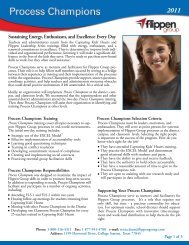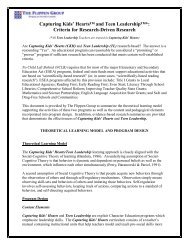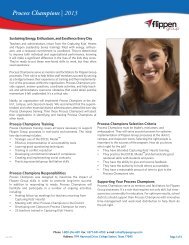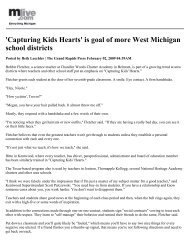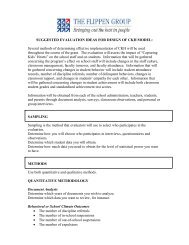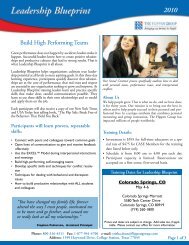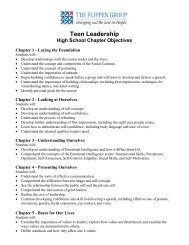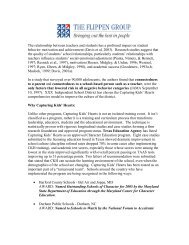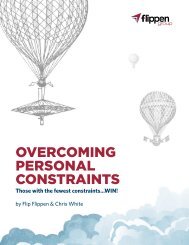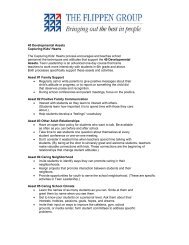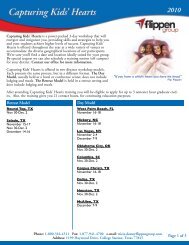Smart & Good High Schools - The Flippen Group
Smart & Good High Schools - The Flippen Group
Smart & Good High Schools - The Flippen Group
- No tags were found...
Create successful ePaper yourself
Turn your PDF publications into a flip-book with our unique Google optimized e-Paper software.
CHAPTER 5: Fostering the 8 Strengths of Character—Outcome 1ing the problem. We come back and discuss those.1. How do the solutions proposed in the readings comparewith the ones we came up with?2. Are some solutions better than others? If so, how?3. Can we add to them?We’re reaching for much more than just passing the APexam. <strong>The</strong> exam doesn’t ask them for solutions to anything.I want them to look for solutions to social problems. I wantthem to be part of the solution.So you’re going beyond what’s required in a normal AP class?Yes—and in the reading requirements as well. In our 11thgradeAmerican History course, we use over 200 additionalreadings—everything from an op-ed essay to a New YorkTimes Magazine article. For each reading, they highlightwhat they consider the important points. No zeroes aregiven; if by Friday something is missing, I ask them to stayafter school to do it. So far this semester, everybody in bothblocks has turned in everything—every reading, every quiz,every exam. <strong>The</strong>y keep up; they know I mean business.What type of students take Paideia?We do tend to get the best students in the school, but it’snot like they’re all National Merit scholars. I’ve got a kidthis year, Joey—not an academically sharp kid, but he keptbugging me, ”Can I please get in? I’ll sit on the floor.” He’snot doing all that well on exams, but he’ll improve as we goalong.You also have to measure what these kids are doing againstwhat the school’s best students were doing before Paideia.Before 1987, in what was then called our “Gifted and TalentedClass,” students read one novel all year.<strong>The</strong> program engages students. Discussions often run longerthan I plan because there’s so much intensity in the room.<strong>The</strong>y can go for 20 minutes without my saying anything.100% of this school’s Paideiagraduates go to four-year colleges.What challenges do you face?<strong>The</strong> classes get bigger every year. When we started, we had20 students in a class. Now we have 40. That makes itharder to get everybody involved in the discussion. We needmore faculty in order to expand the program.Is there a capstone project?<strong>The</strong>ir major senior project is a University of Michigan-styledebate. <strong>The</strong>y choose controversial issues—gun control, samesexmarriage, and the like. We tell them it’s best to do theside you do not believe in. To prepare, they must do a seriesof research pieces using the Internet, magazines, andbooks—a certain amount from each source.We also try to get every student to go to Washington,D.C. for a week to see the government in action. This programis run by the Close-Up Foundation (www.closeup.org).Two kids from our school room with two kids from anotherstate. Some have never stayed in a hotel before. At $1,400a student—many of our kids are on public assistance—wedo a lot of fundraising. Last year we had so many studentsthat we had to go on two planes.<strong>The</strong>y observe Congress and the Supreme Court and interviewgovernment officials. We go to the Holocaust Museum;on the last trip, we stayed there for four hours. Studentswere most moved by the room that contains thousandsof children’s shoes.In Paideia, we are already a small learning community; ourkids really bond over the three years of the program. Butthe Washington trip—besides being a tremendous learningexperience they talk about in class for months after—makesus even more like a family. <strong>The</strong>re’s a special power in doingsomething like this together outside of the classroom.“<strong>The</strong>re’s a special power in doingsomething together outsidethe classroom.”Have you done any follow-up to see what your graduates dowith their lives?It would be wonderful to have a grant to do that. We doknow that some of our students go to places like Stanford,Harvard, and Yale and become doctors, professors, and engineers.Quite a few of our graduates send us checks so thatother kids can go on the D.C. trip.We think there are many larger lessons to be drawn fromthis school’s implementation of Paideia:1. A curriculum that requires students to read widely,think deeply, and discuss vigorously can produce a passionfor learning—and high levels of engagement andachievement among students normally underserved.2. Like a core works program, Paideia requires talented,dedicated faculty and may not be easy to “scale up.”3. While this model may be difficult to replicate widely,91<strong>Smart</strong> & <strong>Good</strong> <strong>High</strong> <strong>Schools</strong>



